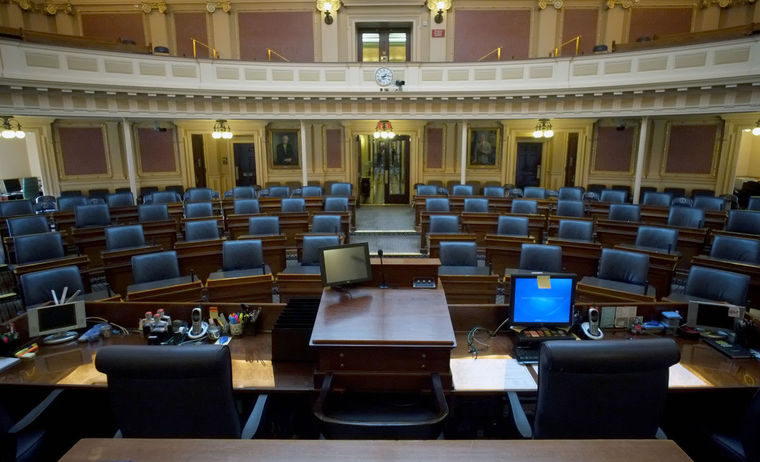
EMPTY VIRGINIA LEGISLATIVE CHAMBER
Did the office of Virginia Attorney General Mark Herring and the Virginia Department of Behavioral Health and Developmental Services (DBHDS) intentionally delay releasing an embarrassing report until the state’s elected legislators had gone home?
The timing of the release of the report and the meeting schedule of Virginia’s General Assembly, which only convenes three months per year, suggests so.
I’ve already published several blogs about Jamycheal Mitchell, the 24 year-old African American inmate with mental illness who suffered a heart attack last August after starving himself while waiting for a bed in a state hospital. His lifeless body was found covered with feces in a cell at the Hampton Roads Regional jail where he’d been imprisoned after stealing $5 worth of snacks from a convenience store. Mitchell had spent 101 days waiting to be transferred and had weighed 144 pounds when he’d died — 34 pounds less than when he had been booked healthy into jail.
Seven months after Mitchell’s death, I began filing freedom of information requests and questioning why the DBHDS, which oversees state hospitals in Virginia, was taking so long to release a report that would explain why Mitchell was allowed to literally starve himself to death. I also questioned why the state Office of Inspector General had not released its investigation since the results of those IG reports historically had been made public about four months after a death.
In response, a spokesperson for the Inspector General’s office explained that it couldn’t finish its probe until the DBHDS released its inquiry. The DBHDS simply said it was moving as quickly as it could. On March 21, the DBHDS finally released its findings and on April 5, the state IG issued its report.
That’s when I noticed a curious, one line statement in the 16-page IG review. It stated that the DBHDS had actually finished its investigation into Mitchell’s death in December 2015 — four months after Mitchell’s death in August.
That’s right. Four months after he was found in his cell that report was done. Why wasn’t it immediately released?
According to the one line in the IG’s report, it wasn’t made public because it was “forwarded to the (DBHDS) Assistant Commissioner for Forensic Services for review and then the Office of the Attorney General.”
And it sat in one or both of those office for another four months. That’s right, four more months.
If you take out a calendar, you will see that the first day of Virginia’s legislative session began on January 13 and the General Assembly adjourned on March 12.
That’s the exact time period when the DBHDS report about Mitchell was being “reviewed” by the Attorney General and an DBHDS assistant commissioner.
A coincidence?
Consider this: rather than naming names of individuals who watched a healthy young man starve himself to death while he was reportedly being visually seen every half hour by a correctional officer and checked daily by a nurse in jail, the investigative reports blamed Mitchell’s death on “clerical” errors and “system failures.”
A young man with a serious mental illness died in a jail cell and rather than full disclosure, DBHDS officials and the Virginia Attorney General’s office appear to be doing damage control and playing politics. The public still has not been told exactly what happened in that jail or what the state intends to do to prevent future needless tragedies.
Virginia’s elected legislative leaders should be angry about being duped. Jamycheal Mitchell deserved better and so do we.
Minutes after posting this blog, I received this note from a reader:
Are these the officials that need to be questioned?
*Michael Schaefer, Assistant Commissioner of Forensic Services – (804) 786-2615
*Mark R. Herring, Attorney General’s Office
900 East Main Street
Richmond, Virginia 23219
Phone: (804) 786-2071
Consumer Complaint Hotline:
1(800) 552-9963
(I also found this online. )
Commonwealth Goals:
• Be recognized as the best-managed state in the nation
• Be a national leader in the preservation and enhancement of our economy
• Elevate the levels of educational preparedness and attainment of our citizens
• Inspire and support Virginians toward healthy lives and strong and resilient families
• Protect, conserve and wisely develop our natural, historical and cultural resources
• Protect the public’s safety and security, ensuring a fair and effective system of justice and providing a prepared response to emergencies and disasters of all kinds
• Ensure that Virginia has a transportation system that is safe, enables easy movement of people and goods, enhances the economy, and improves our quality of life



